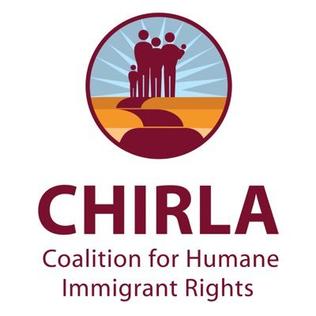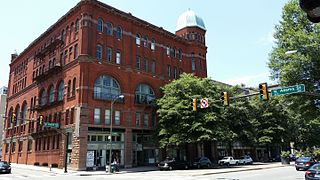
The Sentencing Project is a Washington, D.C.-based research and advocacy center working for decarceration or to reduce the use of incarceration in the United States and to address racial disparities in the criminal justice system. For three decades the organization, with a small staff and funding from foundations and individuals, has regularly produced nonpartisan reports and research used by state and federal policymakers, administrators, and journalists as they consider crime and punishment.
Legal aid is the provision of assistance to people who are unable to afford legal representation and access to the court system. Legal aid is regarded as central in providing access to justice by ensuring equality before the law, the right to counsel and the right to a fair trial. This article describes the development of legal aid and its principles, primarily as known in Europe, the Commonwealth of Nations and in the United States.

The University of Virginia School of Law is the law school of the University of Virginia, a public research university in Charlottesville, Virginia. It was founded in 1819 by Thomas Jefferson as part of his "academical village" which became University of Virginia where law was one of the original disciplines taught. UVA Law is the fourth-oldest active law school in the United States and the second-oldest continuously operating law school. The law school offers the J.D., LL.M., and S.J.D. degrees in law and hosts visiting scholars, visiting researchers and a number of legal research centers.

The Tahirih Justice Center, or Tahirih, is a national charitable non-governmental organization headquartered in Falls Church, Virginia, United States that aims to protect immigrant women and girls fleeing gender-based violence and persecution. Tahirih's holistic model combines free legal services and social services case management with public policy advocacy, training and education.

The Coalition for Humane Immigrant Rights, also known as CHIRLA, is a Los Angeles county-based organization focusing on immigrant rights. While the organization did evolve from a local level, it is now recognized at a national level. The Coalition for Humane Immigrant Rights of Los Angeles organizes and serves individuals, institutions and coalitions to build power, transform public opinion, and change policies to achieve full human, civil and labor rights. The Coalition for Humane Immigrant Rights of Los Angeles also has aided in passing new laws and policies to benefit the immigrant community regardless of documented status.

Texas RioGrande Legal Aid formerly Texas Rural Legal Aid (TRLA) is a nonprofit agency that specializes in providing free civil legal services to the poor in a 68-county service area. It also operates a migrant farmworker legal assistance program in six southern states and a public defender program in southern rural counties of Texas. Established in 1970, TRLA is the largest legal aid provider in Texas and the second largest in the United States.
The City Bar Justice Center provides pro bono legal services to low-income clients throughout New York City. It is part of the Association of the Bar of the City of New York Fund, Inc., a 501(c)(3) corporation.
Legal aid in the United States is the provision of assistance to people who are unable to afford legal representation and access to the court system in the United States. In the US, legal aid provisions are different for criminal law and civil law. Criminal legal aid with legal representation is guaranteed to defendants under criminal prosecution who cannot afford to hire an attorney. Civil legal aid is not guaranteed under federal law, but is provided by a variety of public interest law firms and community legal clinics for free or at reduced cost. Other forms of civil legal aid are available through federally-funded legal services, pro bono lawyers, and private volunteers.

The National Legal Aid & Defender Association (NLADA) is the oldest and largest national, nonprofit membership organization devoted to advocating equal justice for all Americans and was established in 1911.
Victoria Legal Aid (VLA), formerly the Legal Aid Commission of Victoria, is an organisation that provides information, legal advice and education with a focus on the prevention and early resolution of legal problems.

The United States government holds tens of thousands of immigrants in detention under the control of Customs and Border Protection and the Immigration and Customs Enforcement (ICE). Immigrants are detained for unlawful entry to the United States, when their claims for asylum are received, and in the process of deportation and removal from the country. During Fiscal Year 2018, 396,448 people were booked into ICE custody: 242,778 of whom were detained by CBP and 153,670 by ICE's own enforcement operations. A daily average of 42,188 immigrants were held by ICE in that year. In addition, over twelve thousand immigrant children are housed by facilities under the supervision of the Office of Refugee Resettlement's program for Unaccompanied Alien Children. Prior to referral to these other agencies, the CBP holds immigrants at processing centers; between mid-May and mid-June 2019, it held between 14,000 and 18,000 immigrants.
Founded in 1972, the Asian Law Caucus (ALC) is the U.S.'s first legal aid and civil rights organization serving the low-income Asian Pacific American communities. The ALC focuses housing rights, immigration and immigrant rights, labor and employment issues, student advocacy (ASPIRE), civil rights and hate violence, national security and criminal reform.
The Urban Justice Center is a non-profit legal services and advocacy organization serving the New York City area. It is known as an incubator for progressive programs and initiatives and for being a significant legal presence in the struggles of New York's poverty stricken and minority populations. Urban Justice Center won the 2020 Webby People’s Voice Award for Law in the category Web.

The Public Defender Service (PDS) for the District of Columbia provides legal defense to individuals on a court-appointed basis for criminal and delinquency cases indigent adult and juvenile defendants/ respondents. Its Mental Health Division provides representation to persons facing involuntary civil commitment based on allegations that the person is a danger to self or others as a result of mental illness. Its parole division represents parolees charged with violating parole and facing revocation before the United States Parole Commission. PDS also provides other legal-related services in DC.
In the United States, a public defender is a lawyer appointed by the courts and provided by the state or federal governments to represent and advise those who cannot afford to hire a private attorney. Public defenders are full-time attorneys employed by the state or federal governments. The public defender program is one of several types of criminal legal aid in the United States.
The Women's Legal Service NSW formerly the Women's Legal Resource Centre, is an independent, non-aligned, non-profit organization funded by the Australian Commonwealth and State Governments. It is part of the Community Legal Centre Network. WLS NSW promotes access to justice, particularly for women who are disadvantaged by their social or economic circumstances.
Prisoner reentry is the process by which prisoners who have been released return to the community. Many types of programs have been implemented with the goal of reducing recidivism and have been found to be effective for this purpose. Consideration for the conditions of the communities formerly incarcerated individuals are re-entering, which are often disadvantaged, is a fundamental part of successful re-entry.

The Central Virginia Legal Aid Society (CVLAS) is a nonprofit organization that provides free legal assistance in civil matters to low-income and elderly residents in central Virginia.
Osborne Association is a non-governmental, multi-service, criminal justice reform, and direct service organization. Osborne runs programs for people who have been in conflict with the law and their families. It operates from community offices in Brooklyn, The Bronx, Buffalo, Manhattan, and Newburgh, New York and inside more than two dozen New York State prisons and jails. They work with the families and communities of incarcerated individuals to try and redress harm done by the criminal justice system, whilst also working to reform the system by challenging racist policies and retributive justice.
Texas Legal Services Center (TLSC) is a nonprofit law firm that provides legal aid with free representation and assistance to Texans who qualify for their services based on income or other criteria. It also provides legal services to Texas residents who may not qualify for services from Texas Rio Grande Legal Aid, Lone Star Legal Aid, Legal Aid of Northwest Texas, or Disability Rights Texas. TLSC provides support services to each of those providers.









